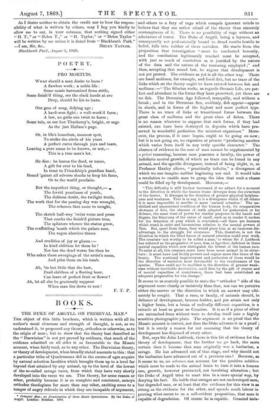POETRY.
PRO MORTUIS.
WHAT should a man desire to leave ? A flawless work ; a noble life : Some music harmonized from strife, Some finish'd thing, ere the slack hands at eve Drop, should be his to leave.
One gem of song, defying age ; A hard-won fight; a well-work'd farm ; A law, no guile can twist to harm ; Some tale, as our lost Thackeray's, bright, or sage As the just Hallam's page.
Or, in life's homeliest, meanest spot, To strike the circle of his years A perfect curve through joys and tears, Leaving a pure name to be known, or not,— This is a true man's lot.
He dies : he leaves the deed, or name, A gift for ever to his land, In trust to Friendship's guardian hand, Bound 'gainst all adverse shocks to keep his fame, Or to the world proclaim.
But the imperfect thing, or thought,— The fervid yeastiness of youth, The dubious doubt, the twilight truth, The work that for the passing day was wrought, The schemes that came to nought, The sketch half-way 'twixt verse and prose That mocks the finish'd picture true, The splinters whence the statue grew, The scaffolding 'neath which the palace rose, The vague abortive throes And crudities of joy or gloom :— In kind oblivion let them be !
Nor has the dead worse foe than he Who rakes these sweepings of the artist's room, And piles them on his tomb.
Ah, 'tie but little that the best, Frail children of a fleeting hour, Can leave of perfect fruit or flower !
Ah, let all else be graciously supprest When man lies down to rest ! F. T. P.






























 Previous page
Previous page